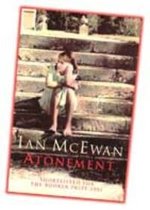1. Why do you think Part One is split into chapters but Parts Two and Three are not?
Part one – organised into different perspectives – allows ambiguity, confusion of perspective
Part two and part three – relentless pace, allows maintenance of the ambiguity, pace at which
everything changes and the consequences of Briony’s crime – ‘interruption of the narrative’
Part 3 – overloads reader with information, much like her own burdening guilt – of does it reflect a
statement? Often the end of crime novels includes an end chapter which ‘ties all lose ends’, reveals
crime – readers still left to judge? Agatha Christie – ‘And Then There Were None’
2. How significant is the narrative structure of the novel?
Misinterpretation and misunderstandings through various perspectives – also creates confusion and
ambiguity
Allows reader to realise that is Briony’s perspective infiltrating the views of other characters
Allows meta-fiction to be achieved – McEwan, not everything we read/perceive is true
3. Early in Chapter One Briony says that there is nothing she cannot describe. It has been said
that “this ability to describe, to fashion the world in words, is both Briony’s gift and her
curse.” To what extent is this true?
Gift – allows her to become a successful novelist, allows her to attempt atonement and give Briony
and Cecilia her ‘final act of kindness’
Curse – leads to her mistakes, hyperbolic, overactive brain which burdens herself and other people,
allows her to escape reality but also infiltrates and distorts her life (‘to trick the reader and herself’)
– by manipulating the reader she can’t achieve full atonement, she can’t even reach an atonement
which satisfies her under the very end of her life.
4. Briony is both participant and narrator in the novel at different times of the story. How does
McEwan’s playing with narrative positions affect how we read the story?
Number 2
5. In Chapter Three we see the first example of Briony misinterpreting what she sees. What
other instances of mistaken seeing are there in “Atonement”?
Robbie and Cecilia believing that Danny Hardman is culpable for the crime, Emily Tallis believing
Marshall that he is a good sort, Robbie being accepted as the criminal due to his lower class, Briony
only taking on nursing as a penance?
6. What are the “crimes” committed in this novel?
Lola and Marshall staying silent, Lola’s rape, Briony’s misinterpretations, War, prejudice against class
leading to devastating consequences, crime against the reader, Briony’s silence, Emily’s bad
parenting, insufficient investigations/crimes of the justice system
7. Is there a “detective” in this novel?
Arguably Briony attempts to piece together what she thinks she knows in Part 1, but she is also a
form of detective in Part 2 and 3, detectives’ roles are discovering who is to blame/culpable for a
crime/events in a crime- Briony’s fiction entails this, but it ultimately the reader who assumes the
‘detective role’ in figuring out who is truly to blame






